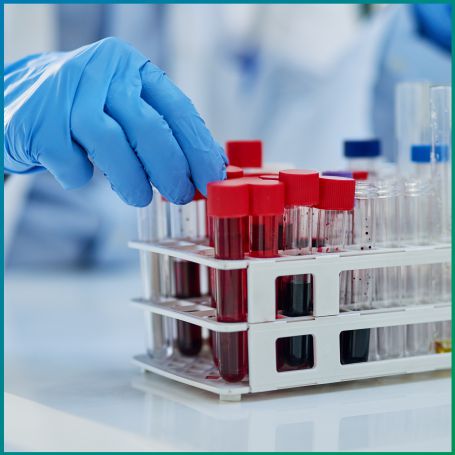
The Biopsy Small Test specifically refers to biopsies that remove only a small amount of tissue for examination.


A Biopsy Small Test refers to a type of biopsy where a small sample of tissue is extracted from the body for examination to diagnose medical conditions, monitor disease progression, or evaluate the effectiveness of treatments. Despite being termed "small," these biopsies are crucial for accurately diagnosing diseases such as cancer, infections, autoimmune disorders, and other systemic conditions. The goal of this test is to provide doctors with valuable insights into the health of a specific organ or tissue, based on microscopic analysis.
1] Needle Biopsy: This is one of the most common methods for obtaining small tissue samples. It involves using a thin, hollow needle to remove a small sample of tissue from organs like the liver, kidneys, or lungs. Needle biopsies are often performed with the help of imaging techniques, such as ultrasound or CT scans, to guide the needle accurately to the area of concern. 2] Endoscopic Biopsy: In an endoscopic biopsy, a small camera (endoscope) is inserted through a natural opening in the body, such as the mouth, nose, or anus, to access the area of interest. Small tissue samples are collected through the endoscope. This method is often used for biopsies of the gastrointestinal tract, respiratory system, or urinary system. 3] Punch Biopsy: A punch biopsy is commonly used to take small skin samples. A special tool is used to remove a small, circular section of skin for analysis. This technique is often used to diagnose skin conditions, such as melanoma or other dermatological issues. 4] Excisional Biopsy: Though more invasive, an excisional biopsy removes a small lump or growth in its entirety. The tissue is then sent to the laboratory for examination. Excisional biopsies are often performed on soft tissue masses and are typically done under local anesthesia.
1] Cancer Diagnosis: Biopsies are essential in the diagnosis and staging of cancer. By analyzing a small tissue sample, pathologists can determine whether the cells are cancerous and if so, the type and grade of cancer. This information helps in planning the appropriate treatment. 2] Infections: Biopsies can also help diagnose infections that are not easily detected by blood tests or imaging techniques. Small tissue samples can be analyzed to identify the specific microorganisms causing the infection, whether bacterial, viral, or fungal. 3] Autoimmune Diseases: In diseases like lupus or rheumatoid arthritis, biopsies can help evaluate tissue damage caused by the immune system attacking healthy cells. For example, kidney biopsies are commonly done to assess damage in autoimmune-related kidney disease. 4] Liver and Kidney Disorders: Small tissue samples from organs like the liver or kidneys can help evaluate the extent of damage due to cirrhosis, kidney disease, or nephritis. A biopsy may be used to assess how the organ is functioning and whether there is a need for medical intervention. 5] Inflammatory and Infectious Diseases: A biopsy may be used to assess areas of chronic inflammation or abnormal tissue growth. It can also help identify underlying causes of conditions like granulomatous disease, tuberculosis, or HIV. 6] Monitoring Disease Progression: In certain cases, a biopsy small test may be used to track the progression of a known disease, especially in cancer, where tissue samples are analyzed periodically to see how the disease is evolving.
You should choose Diagnopein for your BIOPSY SMALL test because we are committed to providing high-quality diagnostic care in a clean and hygienic environment. Our center is equipped with advanced technology to ensure accurate and reliable test results, which are crucial for assessing this test. Diagnopein’s experienced staff is dedicated to handling tests with precision and care, offering you both expertise and comfort. We also offer affordable pricing, making essential health diagnostics accessible without compromising quality. For timely, professional, and affordable cardiac testing, Diagnopein is your trusted partner for your healthcare.
Preparation for a Biopsy Small Test will depend on the type of biopsy and the area being tested. Generally, you may be instructed to avoid eating or drinking for a few hours before the procedure. If you are taking blood-thinning medications, your doctor may advise you to temporarily stop them before the test to reduce the risk of bleeding. Your doctor will provide specific instructions tailored to your case.
The procedure itself is usually not painful, as it is done under local anesthesia or sedation to numb the area. You may feel some pressure or mild discomfort during the tissue extraction, but it is typically manageable. After the procedure, mild soreness may occur at the biopsy site, which can be alleviated with pain relief medication if needed.
After the test, the tissue sample is sent to a laboratory for analysis. You may experience mild soreness, bruising, or swelling at the biopsy site, but these typically resolve within a few days. Depending on the biopsy site, you may need to rest for a short time.
The results of a Biopsy Small Test typically take a few days to a week, depending on the complexity of the analysis. If specialized tests (like genetic or molecular studies) are required, it may take longer.